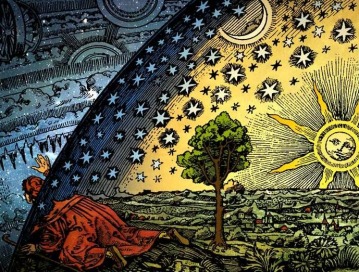
While Apollos was at Corinth, Paul took the road through the interior and arrived at Ephesus. There he found some disciples and asked them, “Did you receive the Holy Spirit when you believed?”
They answered, “No, we have not even heard that there is a Holy Spirit.”
So Paul asked, “Then what baptism did you receive?”
“John’s baptism,” they replied.
Paul said, “John’s baptism was a baptism of repentance. He told the people to believe in the one coming after him, that is, in Jesus.”
On hearing this, they were baptized in the name of the Lord Jesus. When Paul placed his hands on them, the Holy Spirit came on them, and they spoke in tongues and prophesied. There were about twelve men in all.
The Pentecostal worldview does not attempt at any demythologization nor cessationalization of the Biblical worldview. Angels, spirits, demons, visions, supernatural signs are as real as cups and chairs and cars. It is quite different from the materialistic view of the universe. It is also opposed to the occultic view of reality that Pentecostalism regards as based on "deceiving spirits and doctrines of demons" (1 Tim.4:1). In fact, any nature-idolizing ideology (even if it were naturalistic materialism) is no less deceptive (cf. C.S. Lewis, Screwtape Letters).
If one begins labeling Pentecostalism as a mystical tradition, then it wouldn't be far from when people begin labeling any spiritual encounter as "mystic" - which is too broad a defining scope for mysticism. Mysticism involves claims of trans-rational subjective experiences of the "ultimate" which are heavily colored by the religious ideology of the experiencer and privileged to him/her alone. In contrast, Pentecostalism does not involve any claim of that sort. In fact, Pentecostal teachers regard human self-attempts towards mystic experience as dangerous and make it important for one to differentiate between hallucinations, demonic deceptions, and real spiritual experience. Regarding the mystic experience, William James had noted as early as 1902 in his Varieties of Religious Experiences:
Nitrous oxide and ether, especially nitrous oxide, when sufficiently diluted with air, stimulate the mystical consciousness in an extraordinary degree. Depth beyond depth of truth seems revealed to the inhaler. This truth fades out, however, or escapes, at the moment of coming to; and if any words remain over in which it seemed to clothe itself, they prove to be the veriest nonsense. Nevertheless, the sense of a profound meaning having been there persists; and I know more than one person who is persuaded that in the nitrous oxide trance we have a genuine metaphysical revelation.There have been further research done on the similarities of LSD and mystic experiences:
- The serotonergic system and mysticism: could LSD and the nondrug-induced mystical experience share common neural mechanisms? Goodman N1. Abstract says: This article describes the effects and actions of LSD, and due to the similarities with the nondrug-induced mystical experience the author proposes that the two could have common modes of action upon the brain.
- LSD and Mystical Experiences by G. Ray Jordan, Jr. Cities varieties of and similarities between mystical experiences and LSD experiences
At this juncture, it is important to make a differentiation between revelation and mysticism. Revelation, as in the case of miracles, visions, dreams is not a human initiative, at least theologically speaking (though lasting effects like the drenched fleece of Gideon warrant the theological standpoint), and so must not be labeled as mystic experience. However, mystic experiences originating in meditation and use of drugs may be easily explained as induced by some psychologically altered state due to stress, anxiety, or chemical imbalance in the body. Hallucinations can easily occur to physically ill, weak, or strained people. The ‘saintliness’ of a person, in addition, must not be taken as the standard of evaluating the genuineness of the experience. As was seen, William James saw that the mystic experience did have positive effects in the lives of the mystics; however, his conclusion was that the striking differences of mystics regarding theology, often out of their allegiance to diverse traditions, lends them no credulity for absolute truth. Their mystic experiences only possess pragmatic value that is ‘relatively in favor of all these things,’ i.e., their traditional religious suppositions. Thus, there are pantheist mystics, monist mystics, and monotheistic mystics all different from each other and proving that mysticism, originally, has no intellectual content. James also points out the existence of diabolical mysticism as witnessed in delusional insanity and paranoia. Thus, mysticism cannot be the source of absolute knowledge regarding either reality or divine reality. At the most, it is subjective, relative, diversified, and perhaps life-changing, yet devoid of genuine knowledge. Therefore, mysticism is unreliable.






0 comments:
Post a Comment